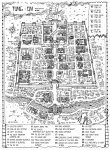Since when does boxed text have anything to do with event resolution? Every single example that's been put forward is about setting up the event, but, nothing about what happens next.
I presume that your players don't talk over you while you describe the NPC? Would you not also describe the surroundings? Where are the doors, what's the furniture, that sort of thing? Again, that's all narration is.
Like I said, I think you should listen to my session if you want to see how I do things. Me providing an artificial example is, like Aldarc points out, not likely to be a good reflection of real play. But let me give an example of how a session might play out a bit:
ME: You get inside the city of Tung-On and the street you are on is filled with merchants and shop stalls
PLAYER A: Can we see the Lucky Mountain Gambling Hall nearby?
ME: Yes, it is just down the street, across from a bunch of inns
PLAYER B: I lead the way to the gambling hall
ME: When you get to the door there are men in blue robes at the entrance.
PLAYER B: I step inside and look around for this Iron God Meng guy.
ME: You see the hall has three tiers and people are playing all sorts of games. You don't see anyone who fits his description.
PLAYER: Do I see any areas that look guarded or like they have large retinues serving an important person?
ME: Yes on the stairs leading up to a section on the third level balcony you see a bunch more of the guys in blue robes and it seems well guarded.
PLAYER B: Okay I walk up to them and shout "Hey Pig Iron Meng, step outside. I have a score to settle."
ME: A large bare chested man with a beard steps out....
PLAYER B: ...Does he have any weapons or important looking items on him
ME: No weapons and no items
PLAYER B: Can I size up his martial arts
[ask player to make relevant skill roll]
ME: You can see that his hands are balled into fists, his knuckles weathered and his flesh (particularly around his belly) is quite weathered and conditioned.
PLAYER B: Okay.
ME: Iron God Meng says "What score do you have to settle with me"
-----------
This is just off the the top of my head. I describe things. Sometimes with flashes of color and flavor. But I let players interrupt. I try to keep it conversational. Again I think if you listen to the things I linked you will have a much better idea of what I mean exactly.











